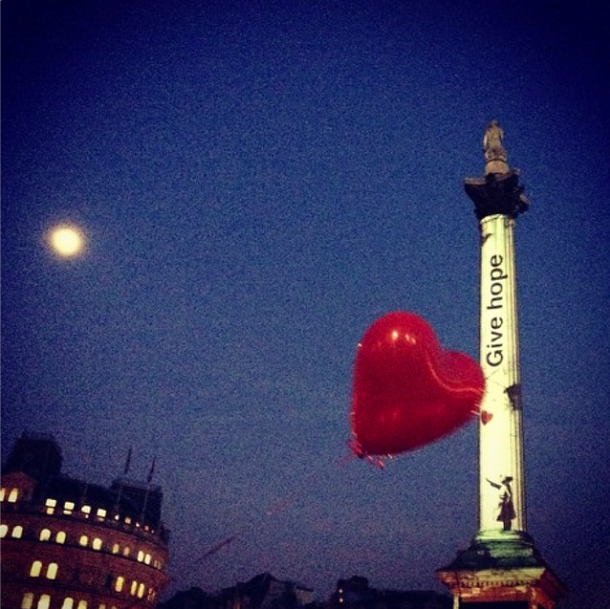
Refugee children remember Syria through music and art in Lebanon.
Last night a #WithSyria vigil was held at Trafalgar Square in London, UK, in solidarity with the people of Syria. Tomorrow marks the third anniversary of a crisis that continues unabated. It has torn families apart and destroyed many lives and homes. Over 6.5 million people have been displaced internally and 2.5 million are now refugees.
As we stood listening to the soundscape of Syrian voices projected onto the square – men, women and children talking about their memories of Syria and what they miss – I was reminded of the Syrian children we met in Lebanon last week, in a camp in Bekaa.
We had spent the day talking to refugee families about their problems with accessing healthcare in Lebanon. In the late afternoon, we went to the camp’s school, set up by a local NGO.
The school encourages children to express themselves through art and music as a form of therapy. Forced to flee their homes, they now live in basic tents and shacks in a heavily populated camp.
Their music teacher is a refugee who lives in the camp himself. He and other musicians and artists recently formed a group encouraging children to write their own song lyrics.
All the songs the children sing emphasize their love for Syria. For them, this is both psychological support and entertainment.
When we got to the school, the children were sitting in a circle singing some of their songs. One by one, the children got up to sing solos about the places they come from and what they miss about home, and then the group sang the chorus.
The chorus of one of the songs went like this (lyrics translated from Arabic to English):
“Papa I don’t want you to bring me a new toy, I want my old toy.I want to forget my suffering. Bring me back.
I don’t want to get used to suffering, take me to where joy is.
We shall return to Syria, no matter how long.
We used to live in a house, now we live in a tent.
Someday black clouds will go away and I will return.”
In another song, the children sang:
“I’m a Syrian in a camp, I forget my suffering and I learn.When someday I learn, I am going to make the whole camp proud.
Syria, you are my love, and I will return back to you.
All evenings in the camp will someday be a memory.”
As well as art and music classes, the school has a puppet show to raise awareness about child labour. The teachers told us that many refugee children work in the field 15-16 hours a day for the private landowners who own the land where the informal settlement is.
Many families said their children work in the fields for US$4 a day, to help their families pay to live on the land.
The schoolteachers said they had asked the landowners to arrange two shifts for the working children – picking beans in the morning and potatoes in the evening. That way, they would have time to continue learning in between.
Being able to go to school means that these children are lucky. According to the UN, half of all Syrian refugees are children, and half of them are not in school.
This month, the number of registered refugees in Lebanon is estimated to pass the one million mark. The Lebanese government and others think that number has already been reached.
With resources stretched to the limit, communities like the one we visited in Bekaa are finding ways to cope as best they can. But this is not enough. The international community needs to do more, to make sure that these children are able to return home to grow up in the country they miss so deeply – Syria.
Follow @KDhala on Twitter.

